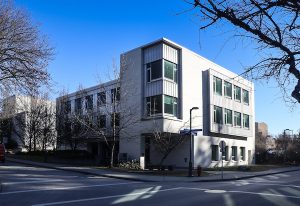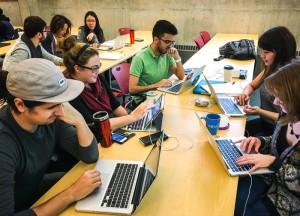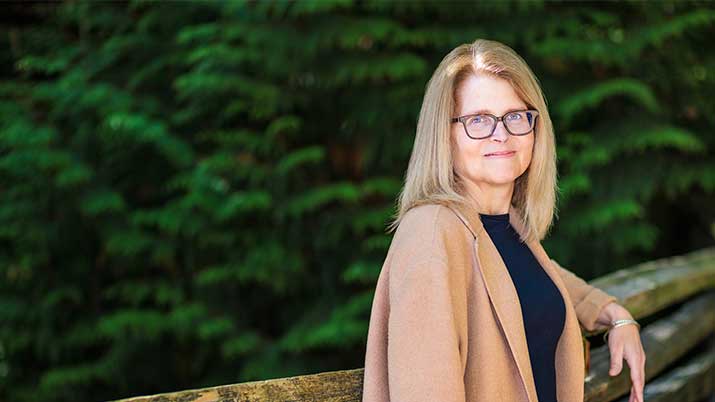

The expansion lays the foundation for a more robust and resilient unit that will serve as a catalyst for innovative research and teaching in journalism and media, writing and communication, and knowledge production and mobilization at UBC.
The larger unit brings together the graduate Master of Journalism program and the undergraduate Arts Studies in Research and Writing program.
The programs provide students with a versatile, diverse and relevant set of communication skills, supporting them to succeed as writers, researchers, journalists and media professionals at a time of significant shifts in communication, politics and society.
“With all of the challenges posed by digitalization and by the rise of intolerant regimes around the world, we are doubling down to produce more and better journalism and scholarship, and continue to foster a literate student body that understands the power of words and the need for responsible communication,” said Gage Averill, Dean of the UBC Faculty of Arts.
“Our expanded School of Journalism, Writing, and Media will have a role in teaching students across UBC’s Vancouver campus. It will be in an extraordinary position not only to research and understand the changes taking place in journalism and communication today, but also to influence those changes.”
World-class faculty
The School of Journalism, Writing, and Media brings together highly experienced, pioneering and diverse award-winning faculty who share their knowledge, experience and research in the classroom. Faculty are known globally for their leadership and contributions to the fields of journalism, writing studies and media studies.
The expanded unit is home to six tenure/tenure-track faculty, an assistant professor without review, a sessional lecturer and nine adjunct professors in the journalism stream. There are three tenured faculty, 13 full-time lecturers and 13 sessional lecturers in the writing stream. As part of the expansion, the faculty is growing with searches under way for three tenure-track positions and five lecturer positions.
“Our faculty have a track record in equipping students with the academic and practical skills to assess and make sense of societal trends, and to communicate effectively with diverse publics,” said Alfred Hermida, Director of the School of Journalism, Writing, and Media.
“By coming together, we are creating a hub and incubator for inter-disciplinary research, teaching and professional practice at a time when there is a pressing need to investigate and understand the changes taking place in media, society and technology.”
Faculty projects create opportunities for students to work as research assistants and gain valuable scholarly and applied experience.
Building on success


Since its founding in 1996, the School of Journalism has emerged as a global leader in journalism research, teaching and professional practice in a period of significant media disruption. It houses the Master of Journalism program which welcomed its first cohort of students in 1998.
Since then, the program has provided students with the professional and scholarly expertise to succeed in journalism and related media careers.
As the only graduate journalism program in western Canada, it prepares students to make a meaningful contribution to the public good through a future career in the evolving journalism and media landscape.
The expansion comes as the Master of Journalism program celebrates its 20th graduating class in March with an event that looks back on the successes of its students and alumni.
The expanded School will continue to offer the graduate journalism program, with students taking the same courses as they do now and graduating with a Master of Journalism degree. It will also continue to offer its three undergraduate journalism courses, and explore providing more opportunities for undergraduate students who want to add journalistic skills to their existing areas of expertise.
Shared interests
Similarly, current courses will continue to be offered in the Writing Studies undergraduate program. Arts Studies in Research and Writing was formed in 2008-09 to offer undergraduate courses in academic writing and research that introduce students to knowledge-making in the disciplines.
The program has become a centre for innovation in undergraduate curriculum development and pedagogies of rhetoric and writing studies, contributing to scholarship of teaching and learning and field research in these areas.
“By bringing together faculty with shared interests in how we produce and share knowledge in different settings, we create opportunities for exciting and necessary collaborations that will shape research, curriculum, and public engagement,” said Laurie McNeill, Chair of Arts Studies in Research and Writing.
“As the newly expanded School, we have the capacity to imagine new possibilities for teaching and scholarship in writing studies, journalism, and media.”
Over the coming months, the School’s website and social media channels will be updated to reflect the new unit, its faculty and programs.


